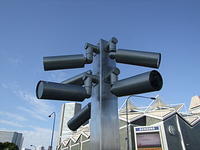-
Strike Two: The CBP’s failure to polygraph its future employees

Two recent reports – one by the DHS OIG, the other by the GAO — raise an alarm not just about CBP’s failure to monitor and ameliorate the use of excessive force by its agents and officers, but also call into question the quality and character of CBP’s current work force. Rather than reassure the public that the CBP is transitioning into a modern, professional law enforcement agency, these two reports highlight the need for increased congressional oversight and study of an agency which is so vital to our national security.
-
-
U.S. worries about proliferation of drone technology
A new Amnesty International report about U.S. drone use in the war on terror says that the drone campaign is killing so many civilians, that it does not only violate international law, but may be a war crime. The report also says that the growing use of drones by the United States in Pakistan, Yemen, and Somalia encourages their use by other states and groups. The United States rejects the figures of civilian casualties cited in the Amnesty report as unreliable, and says that the research methodology the report’s authors used is deeply flawed. The United States does agree, however, that there is a reason to worry about the proliferation of drone technology. “Going forward this is a technology that we know more people will probably get access to,” a State Department spokeswoman said.
-
-
Police departments adopt sophisticated, cheap-to-operate surveillance technology

Advancements in surveillance technology have been adopted not only by the National Security Agency (N.S.A) or other federal intelligence agencies. Local police departments have also incorporated the latest surveillance technologies into their work, allowing them to track individuals for different purposes.
-
-
Backlash: growing interest in counter-surveillance tools
The revelations about the NSA surveillance programs has prompted what some see as high-tech civil disobedience: a growing number of products and applications aiming to limit the NSA’s ability to access encrypted e-mails, obtain phone records, and listen to phone conversations.
-
-
The Red Cross wants video games to incorporate the Geneva Convention
Approximately 600 million video-gamers worldwide may be violating the laws of war – at least virtually. For the past two years, a unit of the ICRC has been working on discouraging video game creators from allowing players to disregard the rules of war – that is, disregard the rules of war while playing a video game, not in real life — without consequences. ICRC calls for gamers to be “rewarded for respecting the law of armed conflict and there should be virtual penalties for serious violations of the law of armed conflict, in other words war crimes.”
-
-
Shutdown shuts down E-Verify
The law requires that businesses verify the work eligibility of new hires within three days of hiring. Staffing companies which place employees with companies do the verification before placing employees. E-Verify has been turned off as a result of the government shutdown, causing headaches for businesses, boosting their administrative costs, and possibly landing them in legal trouble.
-
-
Renewable fuel standard: mend it, don’t end it
Congress should minimally modify — and not, as petroleum-related interests have increasingly lobbied for, repeal — the Renewable Fuel Standard (RFS), the most comprehensive renewable energy policy in the United States, according to a new paper. The paper argues that RFS mandates merely ought to be adjusted to reflect current and predicted biofuel commercialization realities.
-
-
Budget impasse halts enforcement of chemical plants safety standards

Security experts say that short of a direct nuclear attack on a U.S. city, the most dangerous, mass-casualty catastrophe the United States faces is a terrorist attack on, or an accident in, a chemical facility which would release toxic clouds over neighboring cities and towns. The federal government partial shutdown is making it impossible to enforce safety and security standards formulated to strengthen the ability of thousands of U.S. chemical facilities to withstand terrorist attacks.
-
-
Halt of CFATS work disrupts debate over program’s merit
The budget impasse-related halting of monitoring and enforcing compliance with the 2007 Chemical Facility Anti-Terrorism Standards (CFATS) comes at a time of growing criticism of the measure by GOP – but not only GOP – lawmakers, who complain that there are too many problems with CFATS and the way it has so far been implemented.
-
-
DOD policy drives militarization of local police departments
The adoption of military gear by local police departments across America – some call it the “militarization” of American police – has been going on for a while. Now, observers ask whether this trend might have repercussion which should make citizens uneasy. Police department receive the equipment for free – all they have to do is pay for the shipping. The gear being sent to local police includes planes, helicopters, armored vehicles, grenade launchers, assault rifles, bullet-proof helmets, night-vision goggles, and more. A few sheriff departments ordered tanks.
-
-
Calif. Gov. Brown vetoes restrictive assault weapon measures
Governor Jerry Brown of California, saying that “The state of California already has some of the strictest gun laws in the country,” on Friday vetoed two measures which would have restricted the sale and possession of some semi-automatic assault weapons, and two other measures which would have tightened firearms reporting requirements and denied guns to DUI offenders. The governor’s vetoes derailed the most sweeping gun legislation measures to be considered so far this year by the California legislature. Brown signed several smaller pieces of gun legislation into law on Friday.
-
-
House Dems propose comprehensive immigration bill
House Democrats last week released a proposed immigration bill aiming to tighten border security and provide a path to citizenship for millions of undocumented immigrants. The House Judiciary Committee has advanced several bills offering narrower changes to the current immigration law. It is not clear whether the rancor characterizing the budget debate would allow for a bipartisan consideration of either side’s immigration legislative preferences.
-
-
Helping farmers plow through new, complex food safety regulations
The recently passed Food Safety Modernization Act set safety standards on how farmers grow, harvest, and handle fresh produce to reduce the risk of foodborne diseases. The new regulations to minimize food safety risk include testing for water safety and better managing manure storage. Agricultural extension educators should take a flexible approach in teaching farmers about the changing landscape of food safety regulations, researchers say.
-
-
New study shows link between rates of gun ownership and homicides
A new study shows that U.S. states with higher estimated rates of gun ownership experience a higher number of firearms-related homicides. The study, covering thirty years (1981-2010) in all fifty states, found a “robust correlation” between estimated levels of gun ownership and actual gun homicides at the state level, even when controlling for factors typically associated with homicides. For each 1 percentage point increase in the prevalence of gun ownership, the state firearm homicide rate increases by 0.9 percent, the authors found.
-
-
California granting driver's licenses to illegal aliens threatens homeland security: critics
Last Thursday night’s approval of AB 60 by both houses of the California Legislature, granting driver’s licenses to illegal aliens, poses a serious threat to the security of all Americans, critics charge. The critics say that in 2005, in response to recommendations by the 9/11 Commission, Congress enacted the REAL ID Act in order to discourage state governments from issuing driver’s licenses and other identity documents to illegal aliens – and that California’s AB 60 is designed to circumvent requirements of REAL ID Act.
-
- All
- Regional
- Water
- Biometrics
- Borders/Immig
- Business
- Cybersecurity
- Detection
- Disasters
- Government
- Infrastructure
- International
- Public health
- Public Safety
- Communication interoperabillity
- Emergency services
- Emergency medical services
- Fire
- First response
- IEDs
- Law Enforcement
- Law Enforcement Technology
- Military technology
- Nonlethal weapons
- Nuclear weapons
- Personal protection equipment
- Police
- Notification /alert systems
- Situational awareness
- Weapons systems
- Sci-Tech
- Sector Reports
- Surveillance
- Transportation
Advertising & Marketing: advertise@newswirepubs.com
Editorial: editor@newswirepubs.com
General: info@newswirepubs.com
2010-2011 © News Wire Publications, LLC News Wire Publications, LLC
220 Old Country Road | Suite 200 | Mineola | New York | 11501
Permissions and Policies
Editorial: editor@newswirepubs.com
General: info@newswirepubs.com
2010-2011 © News Wire Publications, LLC News Wire Publications, LLC
220 Old Country Road | Suite 200 | Mineola | New York | 11501
Permissions and Policies
